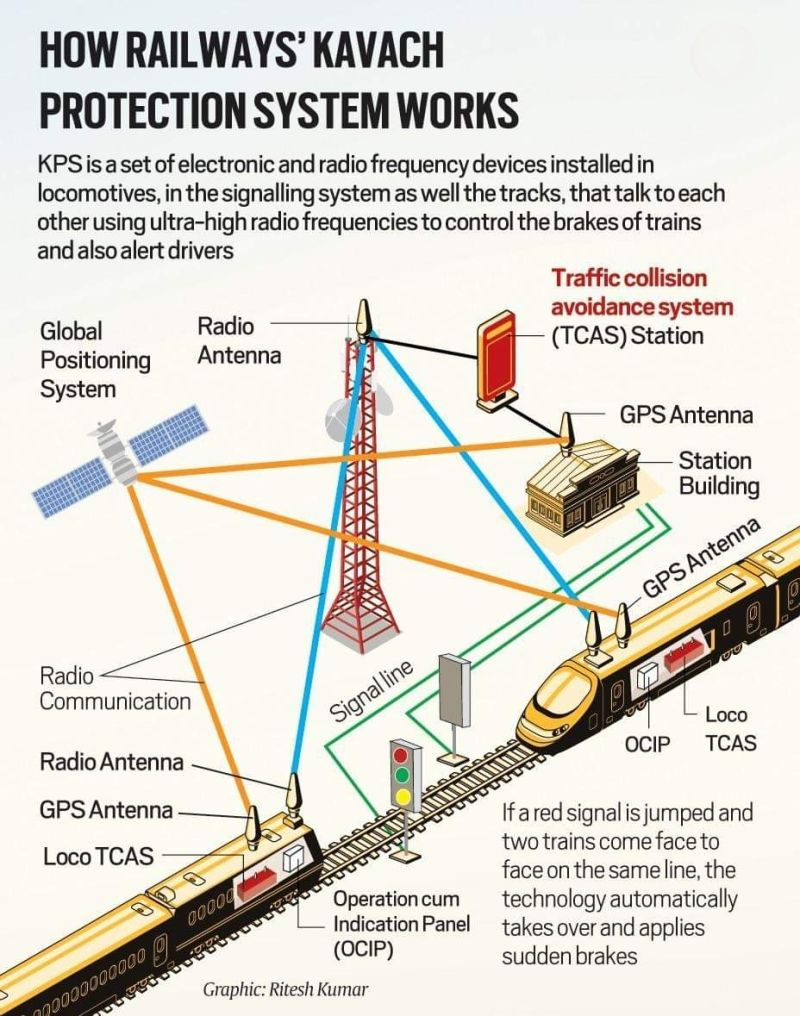Context:
Indian Railways recently commissioned Kavach 4.0, an indigenously developed Automatic Train Protection (ATP) system, on the Mathura-Kota section of the high-density Delhi-Mumbai route.
About Kavach:
Kavach is an indigenously developed cab signaling train control system with anti-collision features, designed by the Research Design and Standards Organisation (RDSO) in collaboration with three Indian vendors.
· It has been adopted as India’s National Automatic Train Protection (ATP) system and conforms to Safety Integrity Level-4 (SIL-4), the highest safety certification for railway systems.
· The system began development in 2015 and was first rolled out on the South Central Railway in 2018. Kavach 4.0, approved in 2025, now supports speeds up to 160 kmph and is manufactured entirely in India.
Kavach enhances railway safety by:
· Acting as a vigilant layer over the existing signaling system, alerting the loco pilot when approaching a danger signal (e.g., red signal).
· Automatically applying brakes if the driver fails to respond, thereby preventing signal overshooting and potential collisions.
· Ensuring safe train speeds in real time, especially in low visibility conditions like fog.
· Facilitating centralized live monitoring of train movement via the Network Monitor System.
· Broadcasting SoS (emergency) messages across the system in crisis situations.
By integrating train communication, monitoring, and control systems, Kavach substantially reduces the risk of human error and strengthens accident prevention mechanisms.
The complexity of Kavach is comparable to setting up a telecom network. The system comprises:
· RFID Tags placed every kilometre along tracks to relay train locations.
· Telecom Towers and optical fibre cable networks for real-time data exchange.
· Loco Kavach and Station Kavach units to control braking and ensure signal compliance.
· Signal integration, enabling loco pilots to receive live updates inside the cab—even in foggy conditions.
Major challenges in deploying Kavach:
Despite its proven benefits, the widespread implementation of Kavach faces several significant challenges:
- High Deployment Cost: The system costs approximately ₹50 lakh per kilometer. Given the vast expanse of Indian Railways—over 68,000 km—scaling up Kavach nationwide requires substantial financial outlay.
- Infrastructure Complexity: Setting up Kavach is equivalent to establishing a small telecom network. It involves installing RFID tags, radio towers, OFC cables, station and locomotive modules all without disrupting existing railway operations.
- Skilled Workforce Requirements: Operating and maintaining Kavach needs specialized training. To meet this need, Indian Railways has partnered with institutions through IRISET to build a trained workforce, but upscaling this effort remains a logistical challenge.
Conclusion:
Indian Railways plans to commission Kavach 4.0 nationwide within six years—an ambitious timeline that showcases India's commitment to passenger safety and technological self-reliance.







